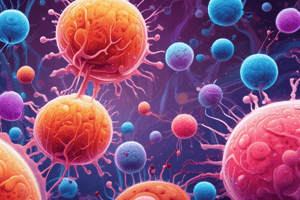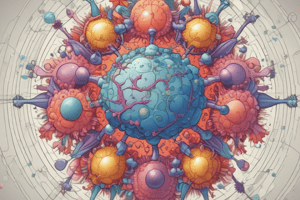Podcast
Questions and Answers
What is the main role of T helper cells in the immune system?
What is the main role of T helper cells in the immune system?
- To mature in the bone marrow
- To secrete cytokines that assist other immune cells (correct)
- To produce antibodies
- To directly kill infected cells
Which type of T helper cell specifically aids in the activation of macrophages?
Which type of T helper cell specifically aids in the activation of macrophages?
- Plasma cells
- T Helper 1 cells (correct)
- T Helper 2 cells
- Cytotoxic T cells
What percentage of peripheral blood lymphocytes are T cells?
What percentage of peripheral blood lymphocytes are T cells?
- 75% (correct)
- 25%
- 50%
- 10%
How do NK cells differ from T cytotoxic cells in their mechanism of target recognition?
How do NK cells differ from T cytotoxic cells in their mechanism of target recognition?
What happens when a B cell becomes activated?
What happens when a B cell becomes activated?
What ratio of T helper cells to T cytotoxic cells is indicated?
What ratio of T helper cells to T cytotoxic cells is indicated?
What role do cytokines play in the immune response?
What role do cytokines play in the immune response?
What is the primary function of T cytotoxic lymphocytes?
What is the primary function of T cytotoxic lymphocytes?
What role do perforins play in the immune response?
What role do perforins play in the immune response?
What is the primary function of the humoral immune response?
What is the primary function of the humoral immune response?
How do naïve B cells become activated?
How do naïve B cells become activated?
Which of the following best describes apoptosis?
Which of the following best describes apoptosis?
What is the role of CD40 in B cells?
What is the role of CD40 in B cells?
What triggers the process of osmotic lysis in target cells?
What triggers the process of osmotic lysis in target cells?
Which cytokines are secreted by T helper cells to activate B cells?
Which cytokines are secreted by T helper cells to activate B cells?
What is the significance of MHC II molecules on B cells?
What is the significance of MHC II molecules on B cells?
What is the primary role of CD8 T cells?
What is the primary role of CD8 T cells?
Which cytokines are produced by activated TH cells to prompt B-cells to mature?
Which cytokines are produced by activated TH cells to prompt B-cells to mature?
What occurs during the activation of macrophages by Th1 cells?
What occurs during the activation of macrophages by Th1 cells?
Which cell type is specifically responsible for cytotoxic activity against virus-infected cells?
Which cell type is specifically responsible for cytotoxic activity against virus-infected cells?
What is the mechanism by which CD8 T cells induce cell death in target cells?
What is the mechanism by which CD8 T cells induce cell death in target cells?
Which components do cytotoxic T cells release to mediate apoptosis?
Which components do cytotoxic T cells release to mediate apoptosis?
What is the result of the absence of Th cells in an individual with certain infections?
What is the result of the absence of Th cells in an individual with certain infections?
How do macrophages kill bacteria after activation by Th1 cells?
How do macrophages kill bacteria after activation by Th1 cells?
Flashcards are hidden until you start studying
Study Notes
Perforins
- Perforins create holes in target cell membranes, allowing granzymes to enter.
- Granzymes activate enzymes leading to DNA degradation and cell death.
Cell Mediated: T-Cell Roles
- FAS receptor signaling leads to apoptosis.
- Apoptosis is a programmed cell death characterized by cell shrinkage and DNA fragmentation.
- Osmotic lysis occurs when perforins allow fluids to enter the target cell, leading to swelling and rupture.
- Apoptosis is faster and more efficient than osmotic lysis.
Humoral Immune Response
- Main function: destroy extracellular pathogens or prevent the spread of internal ones.
- Achieved by producing antibodies or immunoglobulins.
B Cell Surface Molecules
- B-cell receptor (BCR): present on immature B cells, predominantly IgM.
- CD40: essential for interaction with T cells.
- MHC II: presents antigens to T helper cells.
B Cell Activation
- Signal 1: Antigen binds to BCR, activating B cells. B cells engulf, degrade, and present antigens on MHC II.
- Signal 2 (co-stimulatory): Peptide-MHC II complex recognized by T helper cells.
- CD40L binds to CD40 on B cell surface.
- T helper cells secrete cytokines (IL-4, 5, 6, & 10) to activate B cell differentiation into plasma cells.
T-Cell Dependent vs. T-Cell Independent Antigen Activation
- T-cell dependent antigens: require T helper cells for B cell activation.
- T-cell independent antigens: directly activate B cells without T cells, but only produce IgM and no memory cells.
T Helper Cells (Th)
- Th1 cells: stimulate macrophages to kill intracellular pathogens (e.g., Mycobacterium tuberculosis).
- Th2 cells: assist in destroying extracellular pathogens by activating B cells to produce antibodies.
T Cytotoxic Cells (Tc)
- Function: eliminate virus-infected cells and tumor cells.
Lymphocyte Subsets
- Common Lymphoid Progenitor (CLP): gives rise to both T and B cells.
- T cells: mature in the thymus.
- T helper cells: secrete cytokines.
- Cytotoxic T cells: kill infected cells.
- B cells: mature in the bone marrow.
- Plasma cells: secrete antibodies.
T Cells
- Major role in cell-mediated immunity.
- Identified by the presence of the T-cell receptor (TCR) on the cell surface.
- T helper cells: secrete cytokines to assist other immune cells.
- T cytotoxic cells: kill infected cells and tumor cells.
Mechanism of Macrophage Activation by Th1 Cells
- Infected macrophages present peptide-MHC II complexes to effector Th1 cells.
- Th1 cells release interferon-gamma (IFN-γ) causing macrophage activation.
- Activation leads to:
- Enhanced fusion of phagosomes and lysosomes.
- Increased production of reactive oxygen species, nitric oxide, and antibacterial enzymes.
MHC Display Properties
- MHC I: Found on all nucleated cells and presents antigens to CD8+ T cytotoxic cells.
- MHC II: Found on antigen-presenting cells (APCs) and presents antigens to CD4+ T helper cells.
Cell Mediated: T-Cell Roles
- Activated T helper cells interact with antigen-presenting B cells.
- Release cytokines that stimulate B cell maturation and antibody production.
Function of Effector CD8+ T cells (Cytotoxic T Cells)
- Eliminate abnormal cells like virus-infected cells and tumor cells.
- Recognize viral peptides presented on MHC I molecules.
Mechanism of Killing by Cytotoxic T Cells
- Induction of apoptosis:
- Release of cytoplasmic granules: Perforins and granzymes.
- Perforins create pores in the target cell membrane.
- Granzymes activate enzymes leading to DNA degradation and cell death.
- Osmotic lysis: Perforins allow fluids to enter the target cell, leading to cell swelling and rupture.
CD28 Molecule
- Binds to B7 molecule on antigen-presenting cells (APCs) during antigen recognition.
- Provides the second signal for T cell activation.
CD40 Ligand (CD40L)
- Present on activated T helper cells.
- Involved in B cell activation by binding to CD40 on B cells.
Studying That Suits You
Use AI to generate personalized quizzes and flashcards to suit your learning preferences.




